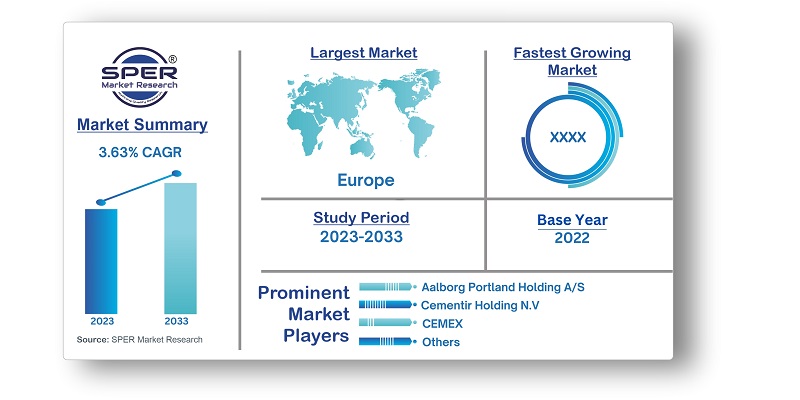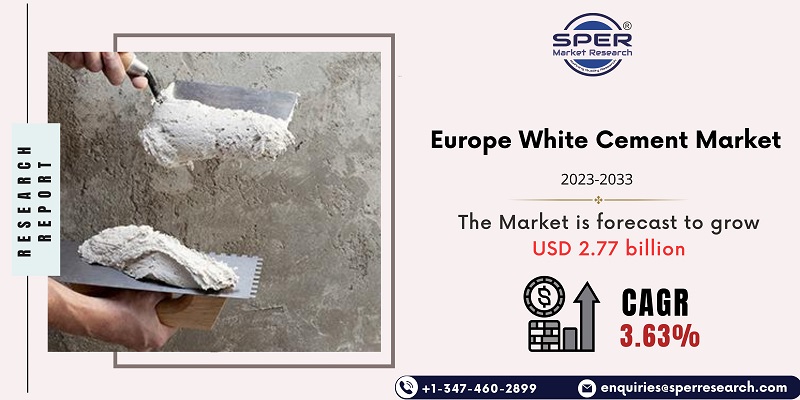
Europe White Cement Market Growth, Size, Trends, Share, Revenue, Demand and Future Outlook
Europe White Cement Market Size- By Type, By End User- Regional Outlook, Competitive Strategies and Segment Forecast to 2033
| Published: Dec-2023 | Report ID: CHEM23114 | Pages: 1 - 156 | Formats*: |
| Category : Chemical & Materials | |||
- February 2023: Northvolt and Volvo Cars declared their intention to construct a battery production facility in Gothenburg, Sweden.


| Report Metric | Details |
| Market size available for years | 2019-2033 |
| Base year considered | 2022 |
| Forecast period | 2023-2033 |
| Segments covered | By Type, By End User |
| Regions covered | Denmark, France, Germany, Italy, United Kingdom, Others |
| Companies Covered | Aalborg Portland Holding A/S, Cementir Holding N.V., CEMEX, S.A.B. de C.V., Cimsa Cimento Sanayi ve Ticaret A.S., Dyckerhoff GmbH, HeidelbergCement AG, Others |
- Architects and Designers
- Artists and Craftsmen
- Building Material Retailers
- Construction Industry Professionals
- Contractors and Builders
- Manufacturers of Cement Products
- Masons and Installers
- Others
| By Type: |
|
| By End User: |
|
| By Region: |
|
- Europe White Cement Market Size (FY’2023-FY’2033)
- Overview of Europe White Cement Market
- Segmentation of Europe White Cement Market By Type (White Masonry Cement, White Portland Cement, Others)
- Segmentation of Europe White Cement Market By End User (Commercial, Industrial, Residential, Others)
- Statistical Snap of Europe White Cement Market
- Expansion Analysis of Europe White Cement Market
- Problems and Obstacles in Europe White Cement Market
- Competitive Landscape in the Europe White Cement Market
- Impact of COVID-19 and Demonetization on Europe White Cement Market
- Details on Current Investment in Europe White Cement Market
- Competitive Analysis of Europe White Cement Market
- Prominent Players in the Europe White Cement Market
- SWOT Analysis of Europe White Cement Market
- Europe White Cement Market Future Outlook and Projections (FY’2023-FY’2033)
- Recommendations from Analyst
1.1. Scope of the report1.2. Market segment analysis
2.1. Research data source2.1.1. Secondary Data2.1.2. Primary Data2.1.3. SPER’s internal database2.1.4. Premium insight from KOL’s2.2. Market size estimation2.2.1. Top-down and Bottom-up approach2.3. Data triangulation
4.1. Driver, Restraint, Opportunity and Challenges analysis4.1.1. Drivers4.1.2. Restraints4.1.3. Opportunities4.1.4. Challenges4.2. COVID-19 Impacts of the Europe White Cement Market
5.1. SWOT Analysis5.1.1. Strengths5.1.2. Weaknesses5.1.3. Opportunities5.1.4. Threats5.2. PESTEL Analysis5.2.1. Political Landscape5.2.2. Economic Landscape5.2.3. Social Landscape5.2.4. Technological Landscape5.2.5. Environmental Landscape5.2.6. Legal Landscape5.3. PORTER’s Five Forces5.3.1. Bargaining power of suppliers5.3.2. Bargaining power of buyers5.3.3. Threat of Substitute5.3.4. Threat of new entrant5.3.5. Competitive rivalry5.4. Heat Map Analysis
6.1. Europe White Cement Market Manufacturing Base Distribution, Sales Area, Product Type6.2. Mergers & Acquisitions, Partnerships, Product Launch, and Collaboration in Europe White Cement Market
7.1. Europe White Cement Market Value Share and Forecast, By Type, 2023-20337.2. White Masonry Cement7.3. White Portland Cement7.4. Others
8.1. Europe White Cement Market Value Share and Forecast, By End User, 2023-20338.2. Commercial8.3. Industrial8.4. Residential8.5. Others
9.1. Europe White Cement Market Size and Market Share
10.1. Europe White Cement Market Size and Market Share By Type (2019-2026)10.2. Europe White Cement Market Size and Market Share By Type (2027-2033)
11.1. Europe White Cement Market Size and Market Share By End User (2019-2026)11.2. Europe White Cement Market Size and Market Share By End User (2027-2033)
12.1. Europe White Cement Market Size and Market Share By Region (2019-2026)12.2. Europe White Cement Market Size and Market Share By Region (2027-2033)12.3. Denmark12.4. France12.5. Germany12.6. Italy12.7. United Kingdom12.8. Others
13.1. Aalborg Portland Holding A/S13.1.1. Company details13.1.2. Financial outlook13.1.3. Product summary13.1.4. Recent developments13.2. Cementir Holding N.V.13.2.1. Company details13.2.2. Financial outlook13.2.3. Product summary13.2.4. Recent developments13.3. CEMEX, S.A.B. de C.V.13.3.1. Company details13.3.2. Financial outlook13.3.3. Product summary13.3.4. Recent developments13.4. Cimsa Cimento Sanayi ve Ticaret A.S.13.4.1. Company details13.4.2. Financial outlook13.4.3. Product summary13.4.4. Recent developments13.5. Dyckerhoff GmbH13.5.1. Company details13.5.2. Financial outlook13.5.3. Product summary13.5.4. Recent developments13.6. HeidelbergCement AG13.6.1. Company details13.6.2. Financial outlook13.6.3. Product summary13.6.4. Recent developments13.7. Others
SPER Market Research’s methodology uses great emphasis on primary research to ensure that the market intelligence insights are up to date, reliable and accurate. Primary interviews are done with players involved in each phase of a supply chain to analyze the market forecasting. The secondary research method is used to help you fully understand how the future markets and the spending patterns look likes.
The report is based on in-depth qualitative and quantitative analysis of the Product Market. The quantitative analysis involves the application of various projection and sampling techniques. The qualitative analysis involves primary interviews, surveys, and vendor briefings. The data gathered as a result of these processes are validated through experts opinion. Our research methodology entails an ideal mixture of primary and secondary initiatives.



Frequently Asked Questions About This Report
PLACE AN ORDER
Year End Discount
Sample Report
Pre-Purchase Inquiry
NEED CUSTOMIZATION?
Request CustomizationCALL OR EMAIL US
100% Secure Payment






Related Reports
Our Global Clients
Our data-driven insights have influenced the strategy of 200+ reputed companies across the globe.




















